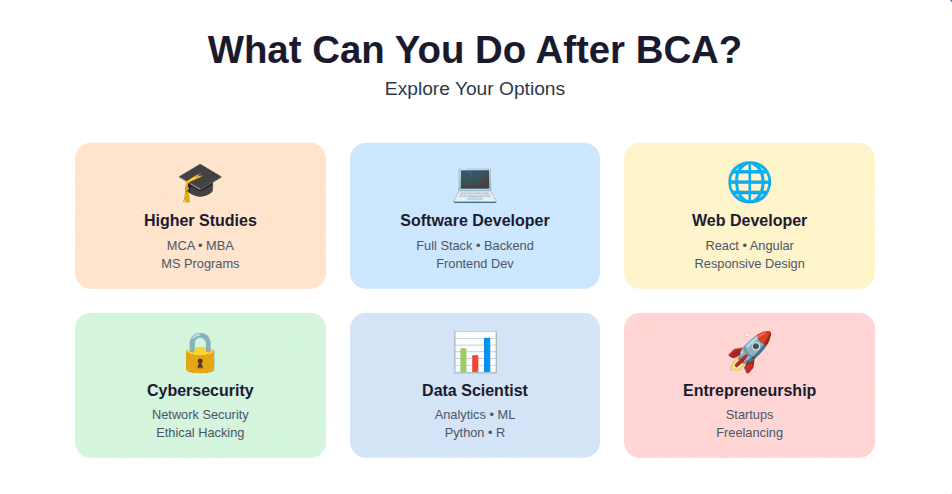So you're doing BCA or just finished it. Now what? Let's talk about where this degree can actually take you.
BCA is a three-year undergraduate program that gets you started in IT and software development. It's practical if you want a shorter degree than B.Tech, or if you're coming from Arts or Commerce and want to switch to tech. With how the IT industry keeps growing, it's honestly a decent choice timing-wise.
But here's the thing- you need to be realistic about what comes next. Let us break down your options.
Getting a Job Right After BCA
Landing a job straight out of college is possible, but it won't happen by itself. During the three years of BCA, build actual projects. Get internships. Learn to code properly. Companies do recruit BCA graduates- TCS, Infosys, startups, and plenty of others. The catch? Expect tougher competition than B.Tech students face. That's just how it is.
Software Development Jobs
Most BCA graduates who get placed end up as Software Developers. The work involves writing code, building applications, debugging problems. Nothing glamorous at first, but it's solid experience. Companies hire BCA students for these roles alongside engineering graduates.
Specializations exist within this field. Front-end developers build what users see and interact with- buttons, layouts, animations. Back-end developers handle databases, server logic, APIs. Full-stack developers do everything. Game development is another route if gaming is your thing.
Fresh graduates typically start at ₹3-4 lakhs annually. The average sits around ₹8.4 lakhs once you factor in different companies and experience levels. Top-tier startups or product companies might offer ₹8-18 lakhs, but only to candidates with genuinely strong skills and portfolios.
Web Developers do similar work but focus purely on websites. JavaScript, HTML, and CSS are mandatory. Pick up React or Angular. Learn Git version control. Understand responsive design because everything needs to work on phones now. Starting pay hovers around ₹3-4 lakhs for freshers.
UI/UX Designers take a different approach- less coding, more design thinking. This role determines how an app looks, how colors work together, where buttons go, how users navigate. Design sense matters here. So does understanding user psychology. Technical skills plus creativity make a good combination for this path.
Data Science and Analytics
Every company wants someone who can make sense of their data. Data Scientists and Data Analysts dig through massive datasets, find patterns, help businesses make smarter decisions. Python or R is essential. Add statistics, machine learning basics, and some SQL.
Data Scientists earn well- average salaries hit ₹11.3 lakhs. Reality check though: most BCA graduates won't walk into Data Scientist roles immediately. Start as a Data Analyst instead (₹6-7 lakhs range). Build experience. Take online data science courses. Consider a master's degree later. Work your way up.
Cybersecurity Jobs
Data breaches make headlines constantly. Companies panic about security. That creates demand for Cybersecurity Specialists. The work involves protecting networks, securing applications, testing for vulnerabilities, staying ahead of hackers.
Pay ranges from ₹6-18 lakhs based on skills and experience, averaging around ₹11.7 lakhs. Here's the thing: certifications matter almost as much as your degree. CEH, CISSP, CompTIA Security+- these credentials open doors. Plan to study for them alongside or after your BCA.
Cloud Solutions Architects design infrastructure on AWS, Azure, or Google Cloud. Salaries run from ₹8-20 lakhs. Sounds great, except this isn't realistic for fresh graduates. Companies want experience first. File this under "potential future career path."
Cyber Security Course by UT Austin for Professionals
Master cybersecurity tools & techniques in UT Austin’s 20-week program. Designed for working pros with hands-on labs, expert guidance & real-world
Other Tech Roles Worth Knowing About
Blockchain Developers work with Ethereum, Bitcoin protocols, smart contracts. Learn Solidity or similar languages, or take free blockchain courses. Pay is decent at ₹7-15 lakhs. The field is still young and growing. Most BCA programs skip blockchain entirely, so self-study is required.
Technical Analysts bridge the gap between business needs and tech solutions. The job involves analyzing systems, spotting inefficiencies, recommending improvements. Average salary runs about ₹10.6 lakhs.
Business Analysts mix technical knowledge with business strategy. Companies hire them to interpret data, improve processes, guide decisions. BCA graduates fit here if they can think beyond pure code. Understanding both technology and how businesses operate gives an edge. Expect around ₹10 lakhs on average.
Network Administrators set up routers, configure networks, keep systems running. The work is steady rather than exciting. Average pay sits at ₹5.25 lakhs- not the highest on this list, but demand stays consistent. Organizations always need their networks maintained.
Non-Coding Options
Digital Marketing is expanding fast. If coding isn't your thing but you like the digital space, this could work. You'll handle SEO, content marketing, analytics, and social media strategy. Many people transition here from technical backgrounds.
Teaching is possible if you have strong grades and want to be a professor or lecturer. You'll need additional qualifications for most college positions.
Technical Support roles use your IT knowledge to help organizations troubleshoot problems. Average salary is around ₹4.5 lakhs. It's not glamorous, but it's a stable option.
Going for Higher Studies
Many BCA students realize they need more education to compete better. Here are your main paths.
MCA (Master of Computer Applications)
This is the most popular next step. BCA + MCA basically equals B.Tech in terms of job opportunities. If you're unhappy with your placement offers or feel underqualified, MCA makes sense.
After MCA, you can target product-based companies (Google, Microsoft, Adobe, Goldman Sachs) which pay significantly more than service companies (TCS, Wipro, Infosys). The difference is substantial- product companies might offer ₹15-30 lakhs while service companies offer ₹3-7 lakhs.
To get into top colleges, you need to crack NIMCET. Good institutions include NIT Trichy, NIT Warangal, NIT Allahabad, JNU, and BHU. Prepare seriously- the exam heavily tests Class 11-12 math. Six to seven months of focused preparation is typical.
Avoid random private colleges for MCA. The return on investment is poor, and you won't see much improvement in job prospects.
MBA
If you want to move away from pure technical work into management, MBA makes sense. After getting your BCA foundation, you can pivot to management roles in tech companies- handling operations, HR, marketing, or product management.
CAT is the main entrance exam. If you score well, you can get into IIMs (Ahmedabad, Bangalore, Kolkata, etc.). An MBA from a good school opens doors to management consulting, product management, and leadership tracks.
Specialized Master's Degrees
Want to specialize in something specific? Consider:
- M.Sc. in Cybersecurity: Great if you have 1-2 years of work experience first
- M.Sc. in Computer Science: Solid general option
- MS in Data Science: High demand, good salaries
- Master's in AI/ML: Hot field right now given the 75% increase in AI/ML engineer demand
- Master's in Blockchain Technology: Emerging field
- Master's in Game Development: If you're passionate about gaming
Studying Abroad
You can pursue a Master's degree outside India. It's expensive- expect ₹20-40 lakhs for Europe, up to ₹1 crore for the US. You'll need strong financial backing or loans.
Popular courses abroad include MS in Computer Science, MS in Data Science, MS in Cybersecurity, or MIM (Master's in Management). Make sure your finances are sorted before committing.
Alternative Career Paths
Work-Study Programs
Companies like Wipro and SAP offer programs where they sponsor your M.Tech (often from BITS Pilani) while you work for them. You get a monthly stipend (around ₹15,000) plus work experience. The catch is you're usually locked in to work for them for a few years. It's worth considering if you want to earn while learning.
Freelancing
You can freelance in web development, video editing, content writing, or AI services. Some students make as much freelancing as they would in a full-time job, especially if they're good at finding clients. You can start this during college or after, sometimes alongside an online degree.
Platforms like Upwork, Fiverr, and Toptal are common starting points. But it requires discipline and business skills- you're essentially running a small business.
Startups
Big tech companies often prefer B.Tech or MCA graduates. But startups (especially Seed or Series A stage) care more about what you can actually do. If you have strong specialized skills- like being really good at React or building APIs- newer companies might hire you based on that alone.
Working at a startup gives you faster learning and broader responsibilities. Later, that experience can help you move to bigger companies.
Government Jobs
Since BCA is a proper undergraduate degree, you qualify for government jobs requiring a bachelor's degree. Options include:
- UPSC exams for civil services
- SSC exams for various government positions
- Banking exams through IBPS or SBI (for Bank PO or Clerk roles)
- State PCS for state-level services
The competition is intense. Government job preparation is basically a separate career path requiring months or years of focused study.
Skills That Actually Matter
Whatever path you choose, you need certain skills. Let me be blunt about what matters:
- Programming: Java, Python, C++, and JavaScript are essential. Learn them properly, not just surface-level syntax. Understand frameworks too- Django, Spring, React, Angular.
- Web Development: HTML, CSS, and at least one modern front-end framework. Most jobs touch web development somehow.
- Databases: Know SQL well. Understand MySQL or PostgreSQL. Familiarity with MongoDB helps too.
- Data Structures and Algorithms: Companies test this in interviews. You need to practice DSA problems regularly if you want decent placement offers.
- Cloud Platforms: AWS, Azure, or GCP knowledge gives you an edge. Cloud is everywhere now.
- Soft Skills: Communication matters more than you think. Can you explain technical concepts clearly? Can you work in teams? Can you manage your time on projects?
- Problem-Solving: This is what companies actually pay for. Can you break down complex problems and solve them systematically?
To learn these skills free, you can visit Great Learning Academy.
Real Talk About the Job Market
The IT sector in India is growing. There's genuine demand for skilled people. But here's what you should know:
- BCA is sometimes seen as less rigorous than B.Tech. Fair or not, that perception exists, especially at service-based companies. You'll face this bias occasionally.
- To overcome it, you need to be better prepared. Work harder on your skills. Build projects. Do internships. Make your resume stand out. A BCA student needs to put in significantly more effort than an average IIT or NIT student to get the same opportunities directly after graduation. That's just reality.
- If you're in third year and haven't built any skills yet, your best bet is honestly to aim for MCA from a top college like an NIT. That gives you a structured path to a good career start.
- But if you've been coding, building projects, and learning consistently, you can get hired directly. Companies do hire skilled BCA graduates. You just need to prove you're worth hiring.
Final Thoughts
BCA gives you a foundation. What you do with it depends on how much effort you put in. Some people get great jobs right after. Some do MCA. Some pivot to management or freelancing. Some go abroad.
There's no single correct path. Figure out what interests you, understand the market, and work toward that. Stay realistic about competition and effort required. Keep learning- the tech field changes fast.
Whatever you choose, commit to it fully. Half-hearted effort won't cut it in a competitive market. But if you're willing to work hard and stay consistent, BCA can definitely lead to a good career.
Further Reading:






